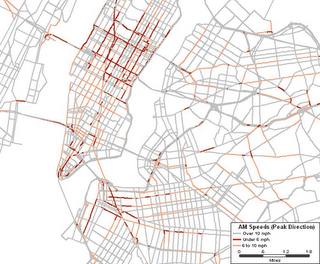 Mayor Mike Bloomberg is set to announce his PLANYC 2030 sustainability initiatives today and congestion pricing, a policy he until recently had avoided, seems to be on the agenda.
Mayor Mike Bloomberg is set to announce his PLANYC 2030 sustainability initiatives today and congestion pricing, a policy he until recently had avoided, seems to be on the agenda.And congestion pricing--which would impose charges for entering the Central Business District at certain times--would deter a significant amount of traffic detouring through Downtown Brooklyn to use the free bridges. It's been recommended by analysts critiquing the Atlantic Yards transportation plan.
[A.M. Peak (6–10 A.M.) congestion graphic from Bruce Schaller's Battling Traffic: What New Yorkers Think about Road Pricing, published by the Manhattan Institute in December. Note significant congestion in Brooklyn around and leading to the planned Atlantic Yards site.]
Bloomberg said on his radio show Friday:
And we have to do a much better job of providing mass transit in parts of the city where the city never invested in the past, and now we’re paying for that. Places way out in Queens, places Staten Island, Brooklyn, there are lots of places in the city that aren’t served by subways. The city lost the courage to keep investing in subways back in World War II…
If you were to charge — and I’ll let you know on Sunday at 12:30 — but if you were to charge, you’d take the money and invest in mass transit.
Coming around
The mayor's taken a while to come around, backing away after a backlash during his first term. Just four months ago, in December, he told John Gambling on his weekly radio address:
Congestion pricing, commuter tax, you probably don’t have a chance of winning. Yeah, it’s a good idea, whether it would work here or not, I’m not a hundred percent convinced. We do have a lot of congestion, but there’s no easy answer.
Congestion pricing has been on the Atlantic Yards agenda since at least December 2005, when Aaron Naparstek cited it as crucial to a traffic solution.
It was given a tiny nod in the Atlantic Yards environmental review, as the Empire State Development Corporation cited a very limited concept of congestion pricing, regarding Nets games rather than an areawide policy:
In addition, congestion pricing has also been incorporated in the proposed mitigation plan in the form of a surcharge that would be imposed for on-site arena parking on game days.
Where's Marty?
Will Borough President Marty Markowitz sign on? He avoided mentioning congestion pricing in his extensive comments on the Atlantic Yards transportation plan.
In the past, Markowitz, playing to supporters in "outer" Brooklyn, has opposed such pricing. In a 2/15/01 press release Markowitz called "tolling the East River Bridges... impractical and discriminatory." Several Brooklyn legislators joined him.
Charles Komanoff's mark-up of an undated (2002?) Markowitz op-ed in the Daily News, headlined Toll East River Bridges? No. Economy, Traffic, Air Would Lose. dissected Markowitz's arguments, arguing that "because politicians like you, Marty, haven't laid out the choices honestly. The choice isn't tolls vs. no tolls, it's tolls vs. devastating cutbacks. Last summer, when a Quinnipiac poll gave New Yorkers the real choice - higher taxes or transit hikes or bridge tolls - every borough chose tolls, resoundingly."
AY and pricing
Interestingly, transportation consultant "Gridlock Sam" Schwartz, who Forest City Ratner hired to design the Atlantic Yards traffic mitigation plan, is a strong proponent of congestion pricing. Apparently that systemic change could not be feasibly recommended for one project.
But it's likely that Forest City Ratner will be a strong supporter of such a change, because it's crucial--though insufficient alone--for any Atlantic Yards transportation plan to have a ghost of a chance.
In Saturday's Times, the congestion pricing plan was described as facing "daunting obstacles." The article stated:
Samuel I. Schwartz, a traffic consultant who favors congestion pricing, said that it would take at least four years before a plan could be approved and put in place. He said that completing an environmental impact study could take at least three years, and fighting the inevitable lawsuits would take another year.
So, four years from now would be the spring of 2011. Does that mean that, in the best-case scenario, the Atlantic Yards arena wouldn't open until 2011? Forest City Ratner must be calling Newark regarding an interim arena for the Nets right now.
Stay tuned to see what other Bloomberg proposals would impact Atlantic Yards and growth in Brooklyn. The Times reported Friday that Bloomberg would propose "using zoning and tax incentives to encourage the construction of 250,000 homes." So, there may be other ways to build beyond state overrides of city zoning, which is what has occurred with the state approval of Atlantic Yards.
Comments
Post a Comment